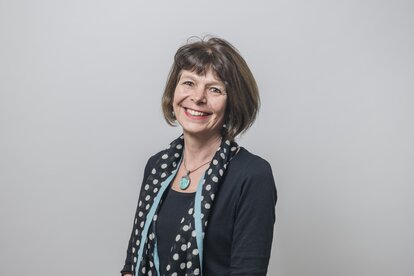Not long ago, I was in Dhading and met an enthusiastic recipient of migrant remittances, Anita Bhujel (see the previous blog). Her daughter is currently working in Jordan in the garment industry. Since then, I’ve had the opportunity to visit the centre at which the young woman was trained in machine sewing though the support of the Safer Migration Project (SaMi), which is managed by Helvetas in partnership with the Swiss Agency for Cooperation and Development, SDC, and the Government of Nepal.
Training for garment factory work
Tucked away in a Kathmandu suburb, the training centre is run by a mother and daughter team. Kabita and Sonali Tamrakar manage their business on commercial lines, but are motivated by more than profit; they express pride in giving an opportunity to young women to earn a decent wage and improve their lives and that of their families. The Tamrakars have invested in modern electrical sewing machines, such as the ones that the young women will have to use overseas, and they aim to make the training as easy and enjoyable as possible. The trainees learn, eat and sleep together for 30 days before leaving the country. Currently all are bound for Jordan; demand for workers is dynamic, and Jordan is the main country taking garment workers at present. In fact, demand has recently become urgent, so trainees with only 15 days’ experience are being accepted – a trend that is bad news for the Tamrakars and, potentially, for the underprepared trainees. Yet they go regardless; overseas employment opportunities for young Nepalese women are very limited, and highly sought. The government has restricted foreign domestic work (with the intention to protect women from abuse), so factory, hospitality or cleaning work are the only legal options.
Hoping for financial independence
SaMi is seeking to reinforce the importance of a full 30 days’ garment manufacturing training – for which the project pays. The project also promotes opportunities to those who come from particularly disadvantaged backgrounds, although it is not possible to take those who have had no schooling whatsoever, as they have to be able to measure and count with precision. Sukumaya Chhinal (on the left), one of the current trainees, studied to grade 8 before dropping out of school shortly after her father died. Raised in Gorkha, she then went to live with her elder brother and sister-in-law in Kathmandu, and worked in small jobs earning roughly US $ 70 – 80 a month. Now 22, she is excited at the prospect of going to another country, and clear about her aim. In Jordan, she can expect to earn some US $ 285 per month; once she has mastered the sewing fully, she might make up to US $ 390 with overtime. “This is a way to save – to have money of my own to make my own future”. Her friend Sunita Dong (on the right) concurred; “You have to grasp the chances that life offers you”. Sunita lost her mother at an early age, and failed her Grade 10 (School Leaving Certificate) exam. Leaving her home town of Hetauda, she found a job as a housemaid in Kathmandu and studied in the evenings so that she could retake the exam. To her, work in Jordan is also a way to a new, more independent future.

Scaffolding training
“Nepalese are known throughout the world for scaffolding; wherever you go, the scaffolders are Nepalese. We have a head for heights”. The three other trainers at the scaffolding training site nodded their heads in agreement with Kamal Singh Bista, who worked in Qatar as a scaffolder for nine years before becoming a trainer. The site is another training opportunity supported by SaMi under its Skilling Migrants component. In this case, the trainees are all young men (no women are allowed on building sites in the Gulf countries to which the trainees are destined) – but they too are selected from poorer, more disadvantaged backgrounds. “One of the ways I select them is to look at their hands – if they are calloused and rough, I know that they are used to hard manual labour” commented the training coordinator, Dandapani Dhakal, unintentionally evoking similar selection during the Chinese cultural revolution. “I want to be sure that they really come from a poor family”. The trainees are new, but already seem well disciplined – something essential for their future work. Are they excited? Resigned seems the more appropriate description in their case. Bikram Rai, aged 25, has already been to Saudi Arabia as a labourer, and knows what awaits – but at least as a result of the training, he can expect specific work with a better wage next time round. Prakash Thapa, a 21-year old from Khotang, sums up what seems to be the general mood, “I love my country, but there is no work here and I have to earn. So I thought OK, let me go and try.”



